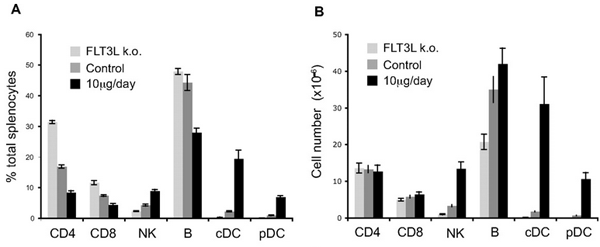FLT3 Ligand (human):Fc (mouse) (rec.)
CHI-HF-211FLT3L
Product group Proteins / Signaling Molecules
Overview
- SupplierChimerigen Laboratories
- Product NameFLT3 Ligand (human):Fc (mouse) (rec.)
- Delivery Days Customer2
- CertificationResearch Use Only
- Estimated Purity>98%
- Scientific DescriptionFMS-like tyrosine kinase 3 ligand (FLT3L) acts as a growth factor that increases the number of immune cells (lymphocytes (B cells and T cells)) by activating the hematopoietic progenitors. It binds to FLT3 (CD135) which is found on multipotent progenitor (MPP) and common lymphoid progenitor (CLP) cells in mice. FLT3L induces the mobilization of the hematopoietic progenitors and stem cells in vivo which may help the system to kill cancer cells. FLT3L is crucial for steady-state pDC (plasmacytoid dendritic cells) and cDC (classical dendritic cells) development. Deficiency of FLT3L causes a dramatic decrease in DC numbers, whereas increasing its availability increase in DC numbers. - Recombinant protein. The extracellular domain of human FLT3L (aa 27-184) is fused to the N-terminus of the Fc region of mouse IgG2a. Source/Host: HEK 293 cells. Purity: >98% (SDS-PAGE). Lyophilized from 0.2microm-filtered solution in PBS. FMS-like tyrosine kinase 3 ligand (FLT3L) acts as a growth factor that increases the number of immune cells (lymphocytes (B cells and T cells)) by activating the hematopoietic progenitors. It binds to FLT3 (CD135) which is found on multipotent progenitor (MPP) and common lymphoid progenitor (CLP) cells in mice. FLT3L induces the mobilization of the hematopoietic progenitors and stem cells in vivo which may help the system to kill cancer cells. FLT3L is crucial for steady-state pDC (plasmacytoid dendritic cells) and cDC (classical dendritic cells) development. Deficiency of FLT3L causes a dramatic decrease in DC numbers, whereas increasing its availability increase in DC numbers.
- Storage Instruction-20°C,2°C to 8°C
- UNSPSC41116100
- SpeciesHuman, Mouse

